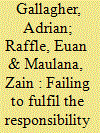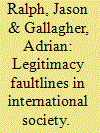|
|
|
Sort Order |
|
|
|
Items / Page
|
|
|
|
|
|
|
| Srl | Item |
| 1 |
ID:
171022


|
|
|
|
|
| Summary/Abstract |
The article provides the first substantive analysis of the war on drugs in the Philippines under the Responsibility to Protect. It develops in two stages. First, it argues that the war on drugs constitutes crimes against humanity through an analysis of, (i) extrajudicial killings and vigilante justice, (ii), dehumanisation, and, (iii) the exaggeration of threat. Second, it examines the response of the permanent five members of the UN Security Council (p5) and the Association of Southeast Asian Nations (ASEAN). Despite that the US, the UK, and France have expressed public concerns, we show that they prioritise counter-terrorism and trade over the Responsibility to Protect. Meanwhile, China and Russia uphold the view that the war on drugs is a matter of domestic jurisdiction. Regarding ASEAN, we draw on 26 semi-structured elite interviews conducted in South East Asia (2016-2018) to evidence that the elites prioritise state sovereignty and non-interference. The outcome is that there is a significant protection deficit as the government of the Philippines, the p5, and ASEAN are failing to protect those targeted in the war on drugs. We hope that the article will act as a catalyst for a much needed conversation on the international community’s political, legal, and moral responsibilities regarding mass violence against drug users in international relations.
|
|
|
|
|
|
|
|
|
|
|
|
|
|
|
|
| 2 |
ID:
139590


|
|
|
|
|
| Summary/Abstract |
There is a perceived legitimacy deficit in contemporary international society. A symptom of this is the political contestation surrounding the 2011 Libyan crisis and its influence on the 2011–13 Syrian crisis. This involved criticism being levelled at the coalition led by the so-called Permanent-3 for the way they implemented the protection of civilians mandate, as well as for the referral of the Libyan situation to the International Criminal Court. How the P3 respond to these developments will be driven in part by how this ‘legitimacy fault line’ is interpreted. The purpose of this article is to first give an interpretation that is informed by the work of contemporary English School scholars and the political theorists they draw on; and second to provide the context in which specific policy recommendations may guide the response of the P3 states. We argue that because the new legitimacy fault line divides on the procedural question of who decides how international society should meet its responsibilities rather than substantive disagreements about what those responsibilities are (that is, human protection and justice) the challenge to the liberal agenda of the P3 is not radical. However, we also argue that ignoring the procedural concerns of the African and BRICS states is not outcome neutral and could in fact do harm to both the ICC and the wider implementation of R2P. We consider two proposals for procedural reform and examine how the P3 response would impact on their claim to be good international citizens.
|
|
|
|
|
|
|
|
|
|
|
|
|
|
|
|
| 3 |
ID:
142428


|
|
|
|
|
| Summary/Abstract |
In the lead up to the 10th anniversary of the Responsibility to Protect (R2P) agreement, pillar II (which refers to international assistance with state consent) was heralded by the United Nations Special Advisor on R2P as the most promising aspect of the Responsibility to Protect. With so little written on pillar II, however, it is difficult to evaluate this judgement. Addressing this lacuna, this article scrutinizes the promise of pillar II to highlight two key strengths. First, the consensual support for pillar II among UN member states reveals that even those that were critical of the R2P in the aftermath of Libya in 2011 still favour the idea of international assistance. At the same time, there remain concerns over the use of force within pillar II as illustrated by events in Côte d'Ivoire in 2011. Second, the utility of pillar II lies in its potential for addressing the threat posed by non-state armed groups. This is particularly important when one considers that in thirteen of the fourteen years since 2000, rebel groups (rather than governments) have been the primary perpetrators of one-sided mass killing against civilians. Accordingly, pillar II can be seen to hold considerable promise for tackling the threat of mass violence by non-state armed groups in the twenty-first century. However, the article also raises concerns over unintentionally legitimizing illegitimate governments through assistance. To illustrate these points it draws on the assistance provided in Mali (2013–15) and Iraq (2014–15).
|
|
|
|
|
|
|
|
|
|
|
|
|
|
|
|
| 4 |
ID:
137094


|
|
|
|
|
| Summary/Abstract |
Paragraph 139 of the World Summit Outcome Document (WSOD) stipulates that the international community is prepared to respond on a ‘case-by-case basis’ in a ‘timely and decisive manner’ when ‘national authorities are manifestly failing to protect their populations’ from genocide, war crimes, ethnic cleansing and crimes against humanity. But what constitutes a ‘manifest failing’? Ten years on from the WSOD, it is evident that there is a large amount of ambiguity and inconsistency in how this term is interpreted and applied. This article highlights the confusion and complexity within the discourse prior to putting forward five policy prescriptions. In so doing, it argues that a more informed understanding of the concept will, primarily, rectify the problems of ambiguity and inconsistency and, secondarily, may help address fears of Great Power manipulation and assist in delegitimising misuse of the R2P.
|
|
|
|
|
|
|
|
|
|
|
|
|
|
|
|
|
|
|
|
|